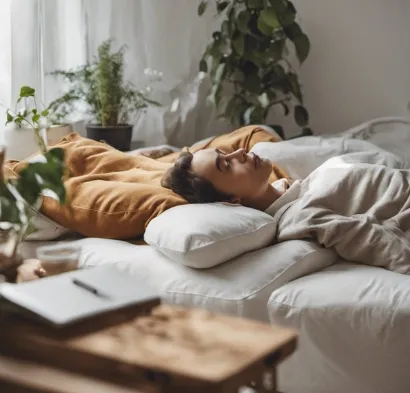How to Sleep Better Tonight: Proven Tips for a Healthier Tomorrow!

In our fast-paced, always-on-the-go world, getting a good night’s sleep can feel elusive. However, understanding how to sleep better is one of the most transformative changes you can make for your health. Quality sleep does more than just refresh you for the next day; it has a profound impact on your physical and mental well-being, fueling your immune system, stabilizing your mood, and sharpening your focus. This article explores why good sleep is essential and offers actionable steps to help you start improving your sleep tonight for a healthier tomorrow.
Why Good Sleep is Essential for Physical and Mental Health
A good night’s sleep is not just about feeling rested; it’s a critical part of maintaining overall health. Quality sleep supports the body in many ways, from boosting the immune system to aiding mental health and emotional stability. Without adequate sleep, our bodies and minds struggle, leading to increased risk of illness, mood swings, and cognitive impairment.
- Boosts Physical Health: Good sleep is closely tied to physical health. During sleep, our bodies undergo important restorative processes, including muscle repair and immune system strengthening. Studies show that individuals who sleep well have a lower risk of developing chronic conditions like heart disease, obesity, and type 2 diabetes. This is partly because deep sleep helps regulate metabolism, blood pressure, and inflammation levels.
- Enhances Brain Function and Emotional Stability: The brain needs sleep to process memories and regulate emotions. When we sleep, our brains consolidate memories, making it easier to learn and retain new information. Lack of sleep, however, disrupts these processes, leading to memory issues, decreased focus, and increased irritability. Chronic sleep deprivation has also been linked to mental health issues such as anxiety and depression, as it hampers the brain’s ability to manage stress.
- Aids in Weight Management: Research has demonstrated that poor sleep can lead to weight gain. When we don’t sleep well, hunger hormones like ghrelin increase, and satiety hormones like leptin decrease. This imbalance can cause people to overeat and make poor dietary choices, leading to weight gain over time.
How to Sleep Better: Top Sleep-Inducing Techniques to Try Tonight
If you’re ready to transform your sleep quality, there are many effective techniques you can try to sleep better starting tonight. These sleep-inducing strategies can help you fall asleep faster, stay asleep longer, and wake up feeling refreshed.
- Create a Consistent Bedtime Routine: Our bodies thrive on routine, and setting a consistent bedtime and wake-up time is one of the simplest ways to improve sleep. Try to go to bed and wake up at the same time every day, even on weekends. This helps regulate your body’s internal clock, making it easier to fall asleep and wake up naturally.
- Limit Exposure to Screens Before Bedtime: The blue light emitted by screens on phones, tablets, and computers can interfere with the production of melatonin, the sleep hormone. To sleep better, try limiting screen time at least an hour before bed. Instead, consider winding down with a book or listening to calming music to signal your body that it’s time to sleep.
- Adjust Room Temperature and Lighting: Research suggests that a cool, dark room is ideal for quality sleep. Aim for a bedroom temperature between 60 and 67 degrees Fahrenheit. Additionally, invest in blackout curtains or wear a sleep mask to block out light, which can disrupt melatonin production and your natural sleep-wake cycle.
- Practice Relaxation Techniques: Techniques like deep breathing, progressive muscle relaxation, and visualization can help calm the mind and body, preparing you for sleep. Guided meditation apps or simple breathing exercises can be great tools to incorporate into your bedtime routine for a smoother transition into restful sleep.
- Avoid Stimulants and Heavy Meals Before Bed: Caffeine and alcohol can disrupt sleep, as can eating a heavy meal close to bedtime. Try to avoid caffeine at least six hours before bed and refrain from eating heavy or spicy foods two to three hours before sleeping. Instead, consider a light snack like yogurt or a banana if you’re feeling hungry.
Mastering Your Mindset: How Relaxation Leads to Quality Sleep
One of the most effective ways to sleep better is to focus on relaxation. Cultivating a calm mindset can help you let go of daily stress and enter a peaceful state conducive to sleep. Here’s how to use mindfulness to enhance your sleep quality.
- Practice Mindfulness Meditation: Meditation can help clear the mind and reduce stress levels, making it easier to fall asleep. Focusing on your breath and letting go of intrusive thoughts can bring a sense of calm. Studies have shown that people who meditate regularly experience longer and deeper sleep than those who don’t.
- Embrace Gratitude Journaling: If stress or anxious thoughts keep you awake, try journaling about what you’re grateful for before bed. Writing down positive experiences from your day can shift your focus from stressors to positivity, making it easier to relax and sleep better.
- Release Negative Thoughts and Worries: Developing a “worry time” earlier in the evening can be beneficial for people who struggle with racing thoughts at night. Setting aside dedicated time to address any concerns can help put your mind at ease, making it easier to leave worries behind when it’s time for bed.
- Use Progressive Muscle Relaxation: Progressive muscle relaxation involves tensing and then relaxing different muscle groups in the body, starting from your toes and working up to your head. This technique can help ease muscle tension, relieve stress, and prepare your body for sleep.
- Visualize Peaceful Scenes: Imagining relaxing settings, like a serene beach or a cozy cabin, can help distract you from stress and anxiety. Visualization techniques activate similar pathways in the brain as actual experiences, promoting relaxation and helping you drift into a restful sleep.
How Your Lifestyle Choices Affect Sleep Quality
Our daily habits significantly impact our sleep. From what we eat and drink to how much exercise we get, lifestyle choices can make or break our ability to sleep better and feel rested.
- Physical Activity and Exercise: Regular exercise can enhance sleep quality, but timing matters. While moderate physical activity can improve sleep, exercising too close to bedtime can have the opposite effect by increasing adrenaline and body temperature. Aim to complete workouts at least a few hours before bedtime.
- Avoiding Caffeine and Alcohol: Caffeine is a well-known stimulant, but it can stay in your system for hours, affecting your ability to fall asleep. Similarly, while alcohol may initially make you feel sleepy, it can disrupt your sleep cycle later in the night, leading to poor-quality rest.
- Diet and Nutrition: Eating a balanced diet with plenty of vitamins and minerals supports healthy sleep. Foods rich in magnesium and tryptophan, such as bananas, nuts, and dairy, can promote relaxation. Conversely, heavy, fatty, or sugary foods before bed can lead to discomfort, making it harder to fall asleep.
- Exposure to Natural Light: Spending time outdoors and getting sunlight during the day helps regulate your circadian rhythm, which is crucial for sleep. Exposure to daylight, especially in the morning, signals your body to stay alert during the day and sleep at night.
- Managing Stress: Chronic stress can keep you up at night, so it’s essential to have stress-management strategies in place. Regular relaxation techniques like yoga, breathing exercises, and spending time with loved ones can go a long way in helping you relax and sleep better.
Small Changes, Big Impact: How to Sleep Better Starting Now
Implementing small changes in your routine can make a big difference in your sleep quality. Even simple adjustments can help you sleep better, starting tonight.
- Establish a Regular Sleep Schedule: Setting a consistent bedtime and wake time helps regulate your body clock and can make it easier to fall asleep and wake up naturally.
- Optimize Your Sleep Environment: Invest in comfortable bedding, minimize noise, and adjust your room temperature for optimal comfort. Little tweaks to your environment can make a substantial impact on sleep quality.
- Limit Daytime Naps: While short naps can be refreshing, long or late naps may interfere with nighttime sleep. If you need a nap, try limiting it to 20–30 minutes earlier in the day.
- Monitor Food and Drink: Pay attention to what and when you eat and drink throughout the day. Hydration is crucial, but try to limit fluids in the evening to avoid waking up during the night.
- Stay Positive and Persistent: Developing good sleep habits takes time, so be patient. Stick with your new routines, and over time, you’ll likely see an improvement in your ability to fall asleep, stay asleep, and wake up feeling refreshed.
Conclusion
Understanding how to sleep better isn’t just about bedtime routines or relaxation techniques; it’s a holistic approach to health that involves lifestyle, mental well-being, and environment. By making these changes, you can transform your nights and unlock a healthier, happier tomorrow. Prioritizing good sleep is one of the best investments you can make in your health, and it all starts with a few small steps.



